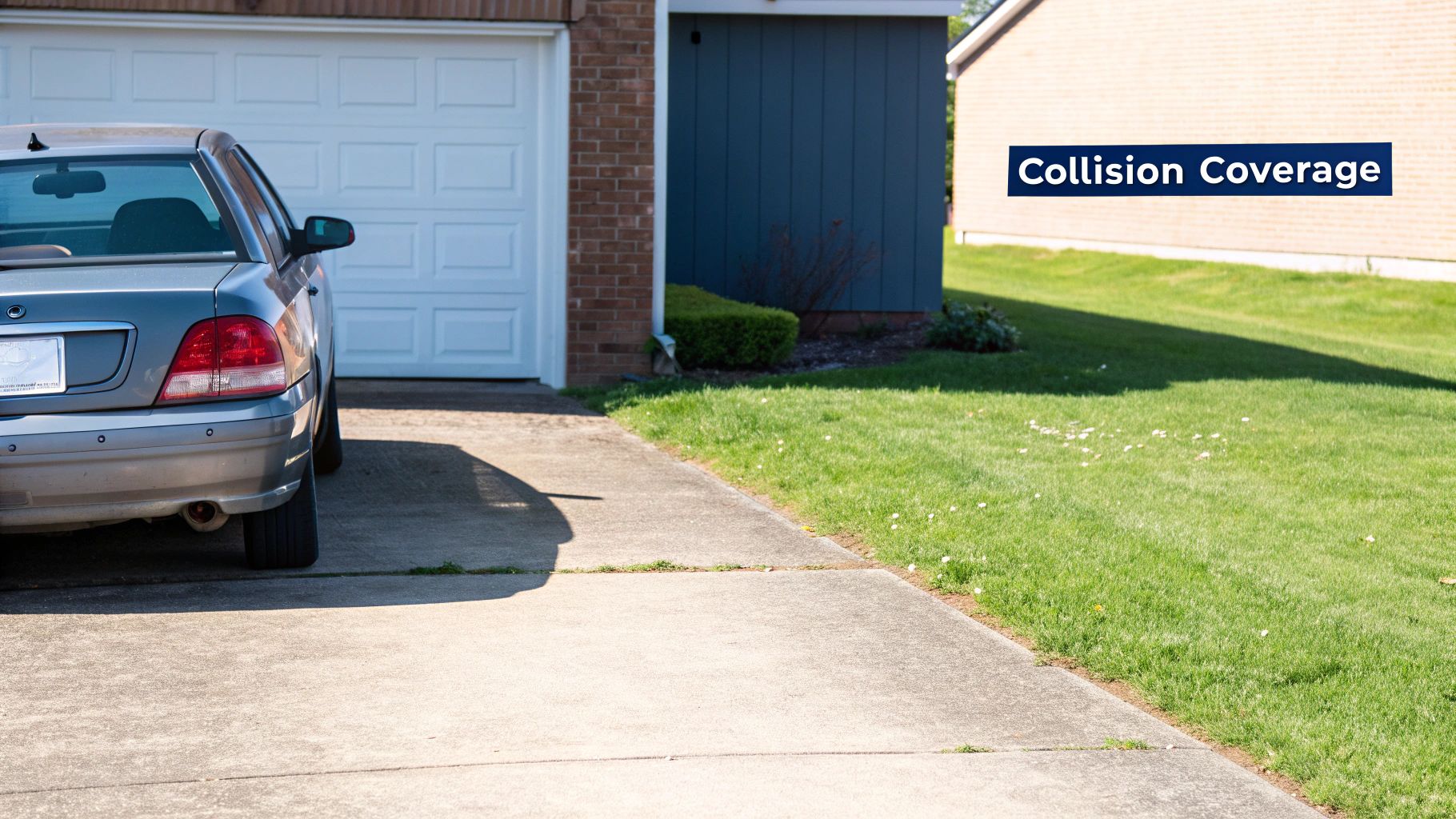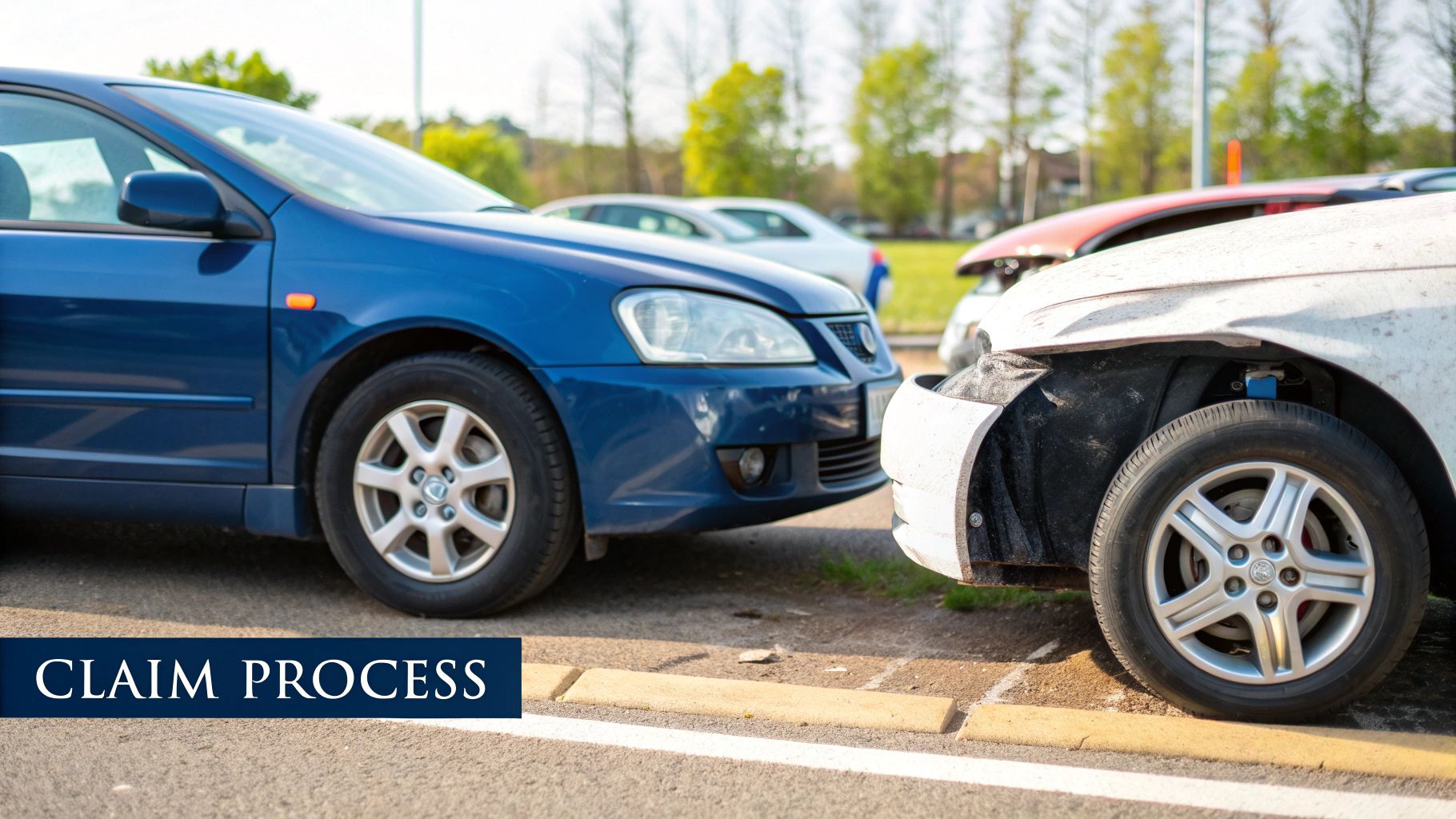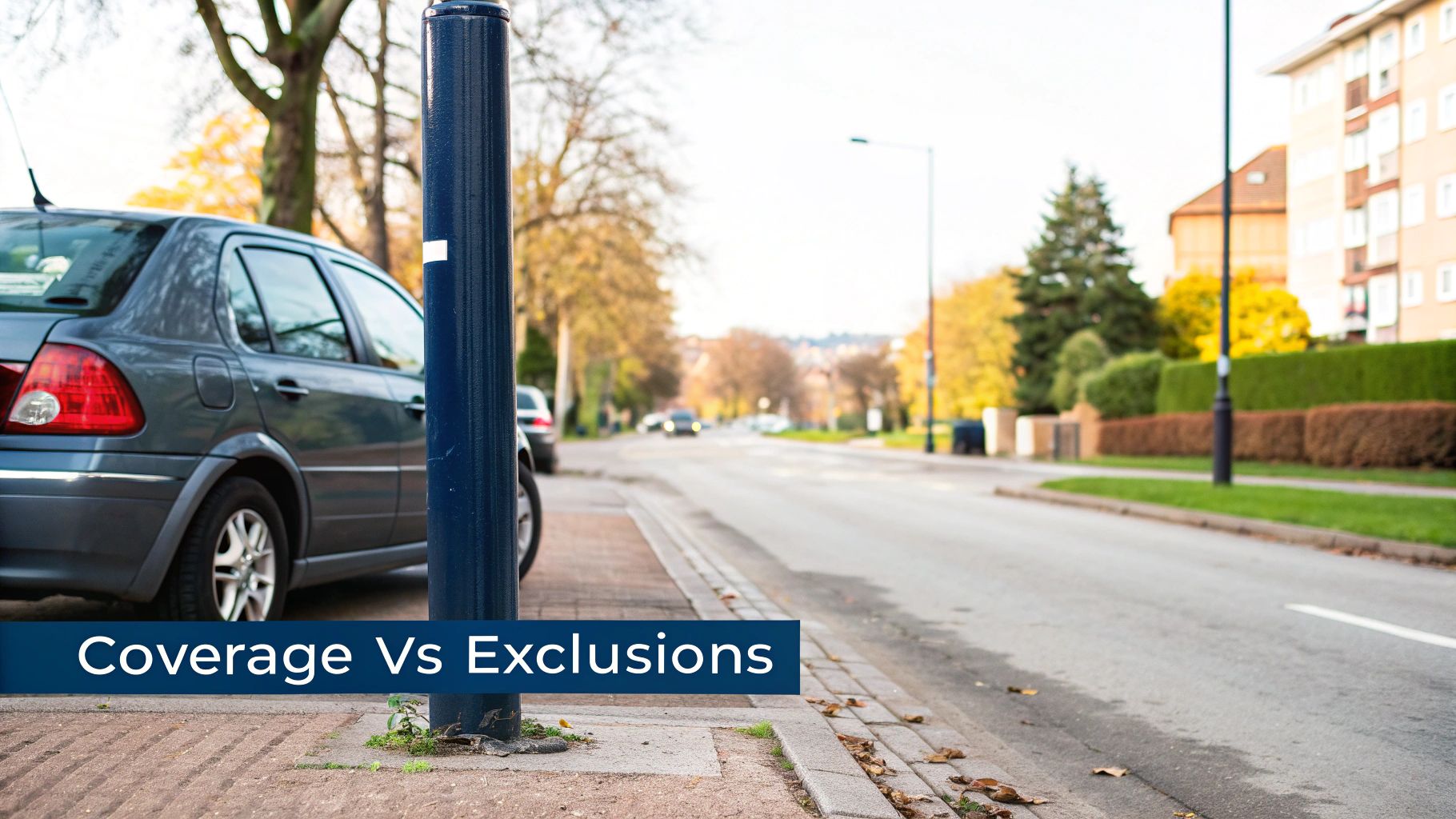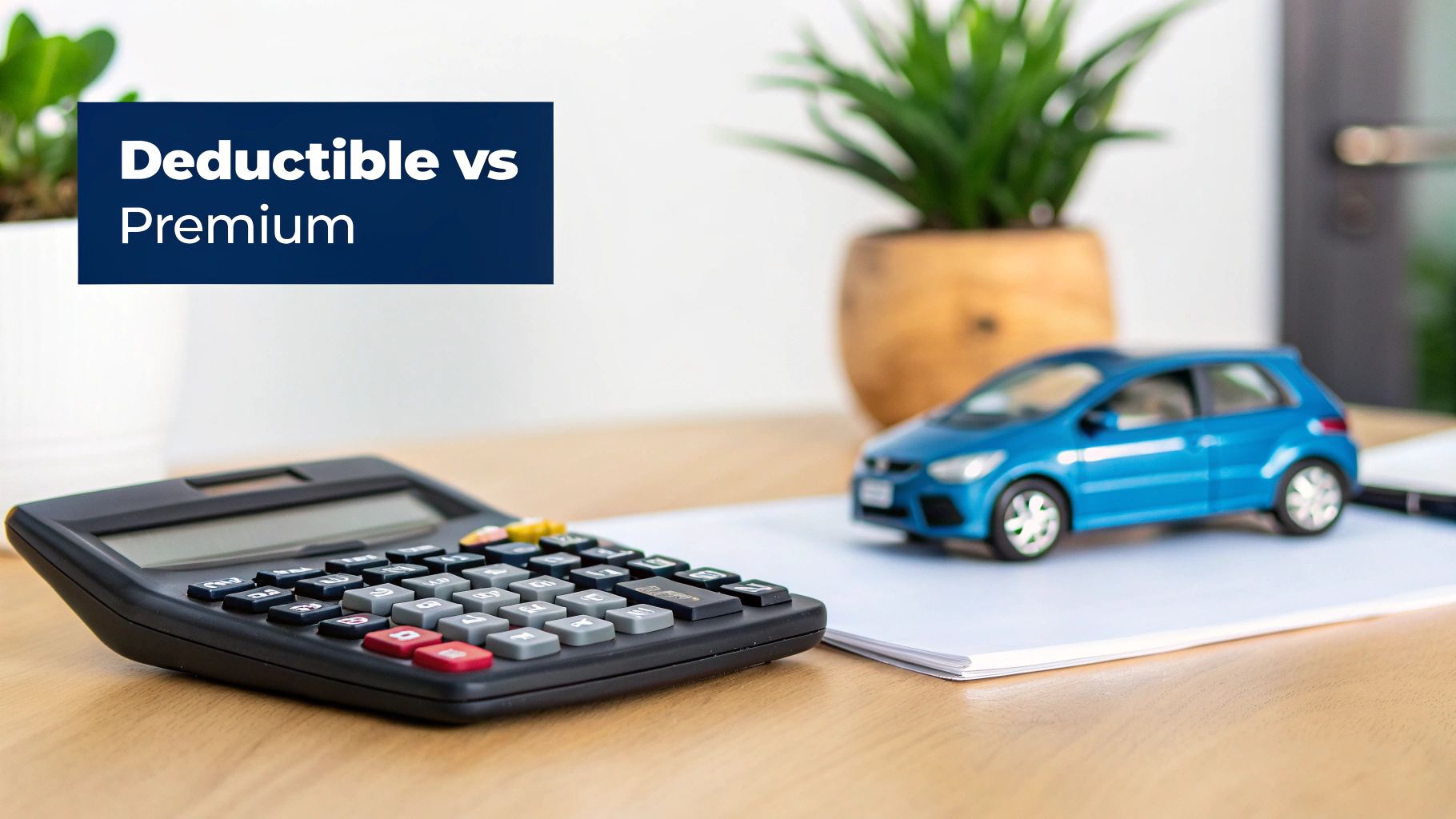What Is Collision Insurance Coverage Explained
- fantasma70
- Oct 22, 2025
- 11 min read
Accidents happen. One minute you’re cruising along, the next you’re dealing with a crumpled fender and a massive headache. This is where collision insurance coverage becomes your best friend. Simply put, it’s the part of your auto policy that pays to repair or replace your own car after an accident, no matter who was at fault.
Think of it as a financial safety net designed specifically to fix your vehicle when it's damaged in a crash.
What Is Collision Insurance in Simple Terms

Let's say you misjudge a parking spot and back into a pole, or you're in a fender-bender at a busy intersection. The other driver's liability insurance (or your own) will cover their car's damage, but what about yours? Your liability coverage won't touch your vehicle's repairs.
That's where collision insurance steps in. Its job is to cover the repair costs for your car after it collides with something—another vehicle, a guardrail, a fence, or even a deep pothole that wrecks your axle. If a collision caused the damage, this is the coverage that gets you back on the road.
The Core Idea: Protecting Your Investment
At its heart, collision insurance is all about protecting the significant amount of money you have tied up in your vehicle. For most people, a car is one of their biggest assets. Without this coverage, one bad accident could leave you with a repair bill that costs thousands of dollars or, worse, a totaled car and no way to replace it.
It's no surprise, then, that 77% of insured drivers in the U.S. carry collision coverage. For more details on this, you can check out the auto insurance statistics from the Insurance Information Institute.
A simple way to remember it: Liability pays for their car, collision pays for your car.
Getting this difference straight is the key to building an insurance policy that actually works for you when you need it most. To make it even clearer, here's a quick breakdown of what collision coverage does.
Collision Coverage at a Glance
This table sums up the essential role collision insurance plays in your auto policy.
Feature | What It Means |
|---|---|
What It Covers | Physical damage to your own vehicle. |
When It Applies | Accidents involving a collision with another car or an object. |
Who Is Covered | You, regardless of whether you were at fault for the accident. |
Why It's Important | Protects your financial investment in your vehicle from costly repairs. |
This coverage is so fundamental that if you have a loan or lease on your vehicle, your lender will almost certainly require you to have it. They need to protect their investment, too. In the sections ahead, we’ll dig into exactly how this coverage works when you have to file a claim.
How a Collision Claim Actually Works

It’s one thing to know the definition of collision insurance, but it’s another to see how it works in the real world. So, let’s walk through a common accident scenario to see how a claim unfolds, from the initial impact to getting your car fixed.
Picture this: you're backing out of a tight parking spot and hear that gut-wrenching crunch. You’ve scraped your car against a concrete pillar. The damage isn't terrible, but it's definitely more than a simple scratch. This is a classic case where your collision coverage comes to the rescue.
After making sure nobody's hurt and documenting the scene, your next move is to contact your insurance company. For a really thorough breakdown of that process, this guide on how to file an auto insurance claim is a fantastic resource.
The Role of Your Deductible
Once you’ve started the claim, your insurer will send an adjuster to look at the damage. Let's say the adjuster estimates the repair will cost $2,500. This is where your deductible enters the picture.
Your deductible is the amount you agreed to pay out of your own pocket before your insurance starts paying. Think of it as your share of the repair cost. If your policy has a $500 deductible, that’s the first $500 you’ll pay directly to the body shop.
Here's how the math breaks down in our example:
Total Repair Cost: $2,500
Your Deductible: -$500
Insurance Payout: $2,000
Your insurance company pays the remaining $2,000 to the shop, and you just cover your part. It’s a simple trade-off: you handle a smaller, predictable amount to avoid a much larger, unexpected bill.
Understanding Actual Cash Value
But what happens if the damage is much worse? If an adjuster determines the repair cost is more than what your car is actually worth, the insurance company will declare it a "total loss." In that case, they won't pay for repairs.
Instead, they will pay you the Actual Cash Value (ACV) of your vehicle.
Actual Cash Value (ACV) isn't what you paid for the car originally. It’s what your car was worth on the open market the moment before the accident happened, factoring in things like depreciation, mileage, and its overall condition.
So, if your car's ACV was calculated to be $15,000, your insurer would send you a check for that amount, minus your deductible. With our $500 deductible, you’d receive $14,500. You can then use that money however you want—as a down payment on a new car or to buy a similar used one. Knowing how ACV works is crucial for setting the right expectations if your car is ever totaled.
So, What Does Collision Insurance Actually Cover?
It's easy to get lost in insurance jargon, so let's cut right to the chase. Think of collision insurance as your car’s repair fund for when you hit something—whether it's another car or a stationary object like a pole or a guardrail.
Simply put, if your car gets dented, scraped, or seriously damaged because it collided with something else, this is the part of your policy that kicks in to pay for the repairs. It doesn't matter if the accident was your fault or not.

What's Covered by Collision
Collision coverage is all about impact. If your car makes physical contact with another object and gets damaged, you're in the right place.
Here are the most common scenarios where collision insurance has your back:
Crashes with other cars: This is the big one. From a minor fender-bender in a parking lot to a major highway pile-up, this is what collision coverage is for.
Hitting stationary objects: Ever backed into a fence post? Or misjudged a turn and scraped a guardrail? We've all been there. Collision handles these mishaps.
Single-car rollovers: If you swerve to avoid something and your car flips, the damage from the rollover is covered.
Pothole damage: Hitting a monster pothole that bends a rim or messes up your suspension often counts as a collision event.
Essentially, if you hit something with your car, you're looking at a collision claim. It's interesting to see how this plays out across different vehicles, too. Some cars just cost more to fix after a crash, which is why you might want to see how insurance losses differ by make and model.
What's Not Covered by Collision
This is just as important. Knowing what collision insurance doesn't cover helps you avoid nasty surprises down the road. Collision is strictly for crash-related damage, which means a lot of other common problems fall under a different type of coverage: comprehensive insurance.
The Easiest Way to Remember: Collision is for fixing your car after a crash. Comprehensive is for fixing it after almost everything else.
Your collision policy will not pay for things like:
Theft or vandalism: If your car gets stolen or someone keys it, you'll need comprehensive coverage to file a claim.
Weather damage: Hail dents, flood damage, or a tree branch falling on your roof during a storm are all handled by comprehensive.
Hitting an animal: This one surprises people. Hitting a deer isn't considered a "collision" in insurance-speak. It's an "act of God" or non-collision event, so it falls under comprehensive.
Fire: If your car catches fire, that’s another job for your comprehensive policy.
Damage you cause to someone else's car: Your liability insurance is what pays to fix the other person's vehicle when you're at fault, not your collision coverage.
Because these two coverages are designed to protect you from completely different types of risk, most people buy them together. Let's break it down side-by-side to make it crystal clear.
Collision vs. Comprehensive What's Covered?
Scenario | Covered by Collision? | Covered by Comprehensive? |
|---|---|---|
You hit another car in traffic. | ✅ Yes | ❌ No |
A tree falls on your car during a storm. | ❌ No | ✅ Yes |
You back into a light pole. | ✅ Yes | ❌ No |
Your car is stolen from your driveway. | ❌ No | ✅ Yes |
You hit a deer on a country road. | ❌ No | ✅ Yes |
Your car is damaged in a hail storm. | ❌ No | ✅ Yes |
Your car flips in a single-vehicle accident. | ✅ Yes | ❌ No |
Having both collision and comprehensive coverage is the only way to fully protect your car from both accidents and unexpected events. Think of them as two halves of a whole, giving you peace of mind no matter what happens.
How Your Deductible Impacts Your Premium

When you're setting up your collision insurance, one of the first big decisions you'll make is choosing your deductible. It's a classic balancing act. Think of your deductible and your premium as two ends of a seesaw—when one goes up, the other has to come down.
Opting for a higher deductible means you're agreeing to pay more out of your own pocket before the insurance kicks in. Since you’re shouldering more of the initial financial risk, your insurance company will usually thank you with a lower monthly premium. This can be a smart way to cut down on your regular bills.
On the flip side, a lower deductible means you’ll have less to pay upfront after an accident. That peace of mind is great, but it also means your insurer is taking on more of the risk. To compensate, they'll charge you a higher monthly premium.
Seeing the Financial Trade-Off
Let's put some real numbers to this. Say you're weighing two different collision coverage plans:
Option A: You choose a $500 deductible. For this, your premium might be around $60 a month. This is a solid choice if you'd rather have a smaller, more manageable bill if you get into a wreck, even if it costs a bit more each month.
Option B: You go with a $1,000 deductible. Your premium could drop to just $45 a month. With this setup, you’d save $180 a year on your premium, but you’d need to have that $1,000 ready to go if you need to file a claim.
The best choice here really boils down to your personal financial situation. Ask yourself: could you comfortably come up with your deductible amount tomorrow without it causing a major problem? If the answer is no, a lower deductible might be the wiser, safer path, despite the higher premium.
The core question to ask yourself is: "How much risk am I willing to take on myself to save money on my premium?" Answering this honestly is key to choosing a deductible that works for you.
Other Factors That Influence Your Cost
While your deductible is a huge piece of the puzzle, it's not the only thing that sets your collision insurance rate. Insurance companies look at a whole host of factors to build a risk profile that’s specific to you.
Here are a few other key elements they consider:
Your Vehicle: The make, model, age, and value of your car matter a lot. A brand-new luxury sedan is going to cost a lot more to fix or replace than a 10-year-old hatchback, so its premium will be higher.
Your Driving Record: A clean driving history is your best friend. If you have a track record of accidents or tickets, insurers see you as a higher risk, and your rates will reflect that.
Your Location: Where you park your car at night makes a difference. Densely populated urban areas with more traffic, theft, and accidents usually come with higher premiums than quiet, rural zip codes.
So, Do You Actually Need Collision Coverage?
Is collision coverage a must-have for your policy, or is it an extra expense you could potentially cut? There's no one-size-fits-all answer here, but figuring it out is probably simpler than you think.
First, let's get one thing straight: no state legally forces you to buy collision insurance. State laws are all about liability coverage—making sure you can pay for the damage you cause to other people and their property. But that doesn't mean collision is always optional.
When The Choice Is Made For You
If you're still making payments on your car, the decision is pretty much out of your hands. Lenders and leasing companies almost always require you to carry both collision and comprehensive coverage. Why? It's simple: they need to protect the asset they have a financial stake in until you've paid it off.
This has been standard practice in auto lending for a long time, and it really shows how critical collision insurance is for guarding against a major financial hit after an accident. You can find more details about this on the Dairyland Insurance resource page. If you decide to drop the coverage anyway, be warned: your lender can buy a policy for you—called "force-placed" insurance—and it's almost always way more expensive than what you'd pay on your own.
The Decision Framework for Car Owners
Now, if you own your vehicle outright, you've got a real choice to make. The decision really just comes down to a gut-check on your car's value versus your financial situation.
A great rule of thumb is to think about dropping collision coverage when the annual premium costs more than 10% of your car's current market value.
Let's break that down. Say your car's actual cash value (ACV) is only $4,000, but your annual collision premium is $500. In that case, you're paying 12.5% of the car's total worth every single year just for this one piece of coverage. At that point, the numbers just might not add up anymore.
To figure out what’s right for your situation, ask yourself a few honest questions:
What's my car really worth? Use a couple of online valuation tools to get a realistic idea of its ACV, not what you think it's worth.
What am I paying for this? Pull out your insurance statement and find the exact line item for your annual collision premium.
Could I handle a total loss? If your car was totaled tomorrow, could you actually afford to repair or replace it out of pocket without derailing your finances?
If your car's value is pretty low and you have a solid emergency fund, you might be better off dropping the coverage and "self-insuring"—basically, tucking away that premium money yourself. But if losing your car would be a financial nightmare, keeping collision coverage is probably worth the peace of mind.
Still Have Questions? Let's Clear Things Up
Alright, let's wrap this up by hitting some of the most common questions people have about collision coverage. Think of this as a quick FAQ to clear up any final confusion and make sure you're feeling confident about how this all works.
Does Collision Insurance Pay for a Rental Car?
This is a big one. The short answer is no, your standard collision policy won't cover the cost of a rental car while yours is getting repaired.
That’s where a separate, optional coverage called rental reimbursement comes in. It’s usually a pretty cheap add-on, but it can be a real lifesaver if you end up needing a car for a week or two. Without it, you’re paying for that rental completely out of your own pocket.
What If an Uninsured Driver Hits Me?
Here’s where your collision coverage really proves its worth. If someone without insurance hits you and it's their fault, you can still use your own collision policy to get your car fixed right away.
You'll pay your deductible upfront, and your insurance company will handle the rest. After that, your insurer will usually go after the at-fault driver to get their money back (and yours!), a process called subrogation. The good news is you don't have to wait for that to play out to get your car back on the road.
The Bottom Line: Your collision coverage is your safety net. It steps in to make sure you aren't stuck with a massive repair bill because someone else didn't have the proper insurance.
Is Filing a Collision Claim Going to Make My Rates Go Up?
It's definitely a possibility, especially if you were the one who caused the accident. When you file an at-fault claim, insurance companies see it as a sign of higher risk, and your premium might increase when it's time to renew your policy.
But it’s not a given. A few things can influence the outcome:
Your Driving Record: If you have a squeaky-clean history, one minor claim might not have a huge impact.
Your Insurance Company: Every insurer has its own way of handling rate adjustments after a claim.
Who Was at Fault: If the accident wasn't your fault, it's far less likely to result in a major rate hike.
It's always something to consider, particularly for minor damage. Sometimes it might make more sense to pay for small repairs yourself instead of filing a claim.
When you're visiting Miami, the last thing you want to worry about is transportation. At Cars4Go Rent A Car, we provide a seamless rental experience with door-to-door delivery, transparent pricing, and a wide selection of quality vehicles. Skip the airport lines and start your trip stress-free by booking your perfect rental car with us at https://www.cars4go.com.



Comments